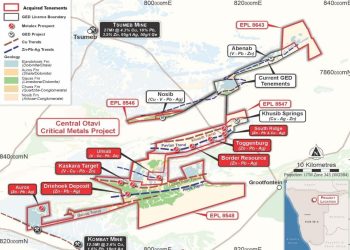
Omaheke’s Regional Governor Pio Nganate says the region is banking on upcoming exploration endeavours in copper and uranium mining to drive economic revitalisation and diversification.
He stated that upcoming mining activities signify a significant change in the region’s economic focus. This shift aims to lessen dependence on agriculture, the traditional economic driver, as Omaheke contends with increasing poverty and declining agricultural output due to repeated droughts.
“Omaheke is plagued by poverty and agricultural challenges, with malnutrition and unemployment on the rise. We need to explore new economic avenues like mining to uplift our communities,” Nganate said.
Nganate highlighted the significance of mining in addressing the region’s economic woes, stating: “With poverty levels at 39%, it’s evident that we need to embrace new opportunities. Mining, particularly the exploration of copper in areas like Witvlei, Otjombinde, Eiseb, and Epukiro Village and Town Councils, along with uranium mining, presents a promising path towards economic growth.”
However, despite the potential benefits, concerns loom among residents, particularly farmers who fear the impact of mining on their livelihoods.
Nganate acknowledged these concerns, stressing the importance of transparent communication and community engagement.
“We must address the fears and misconceptions surrounding mining. Dialogue and transparency are crucial in fostering understanding and garnering support from all stakeholders,” he stated.
To address these concerns, Nganate revealed plans for a symposium in May, bringing together experts to educate the community on mining methods and their implications.
He emphasised the need for collaboration with academic institutions like the University of Namibia (UNAM) to ensure informed decision-making and maximise the benefits of mining ventures.
Nganate acknowledged the long-term nature of such projects, stating that setting up a mine could take seven to nine years. He maintained optimism about the potential long-term benefits, while also emphasising the importance of prioritising development discussions amidst the upcoming election year.
Nganate underlined the urgency of embracing new economic opportunities to propel Namibia towards its vision of becoming an industrialised nation by 2030.
He emphasised the role of mining and technological advancements in addressing pressing issues such as energy security and healthcare, urging stakeholders to seize the opportunity for sustainable development and economic prosperity.
This comes as Noronex Exploration and Mining Company is conducting exploration activities on Exclusive Prospecting Licences (EPLs) No. 8964 and 8965, situated north of Talismanus in the Omaheke Region of Namibia, focusing on base metals, rare metals, and precious metals.
Recently, Noronex Limited has finalised the acquisition of Thunder Gold Corp’s remaining 25% interest in the Dor-Wit copper property for a total of about N$19 million (US$1 million).
Similarly, a Russian mining company with plans to extract uranium in Namibia, Uranium One Group subsidiary, Headsprings Investment, which has been actively exploring the Omaheke Region projects an annual revenue of N$6.6 billion for the next 25 years.
According to the company’s Director of Operations and Mining Engineer, Aldo Hengari, this project not only promises to transform Uranium One’s prospects but also carries the potential to significantly impact Namibia’s Gross Domestic Product (GDP), with projections of a 1 to 2% increase.
This comes as the Headsprings project, known as Wings, which aims to conclude the prospecting and exploration phase by 2026, has only carried out 50% of their exploration due to technical difficulties and thus the figures are set to increase with further exploration. Furthermore, Uranium One has invested approximately N$850 million in the country since its initiation.







